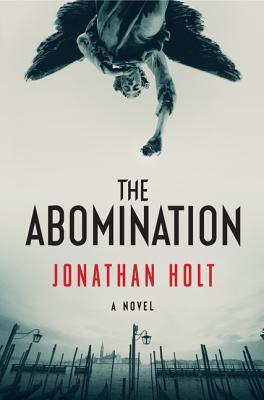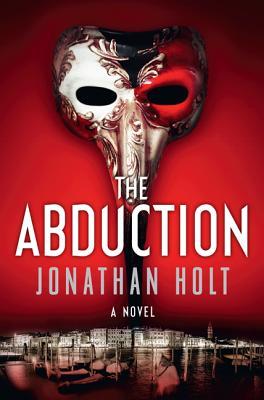Author bio:
Jonathan Holt read English at Oxford, and is now the creative director of an advertising agency. The first novel in the Carnivia Trilogy, THE ABOMINATION, was an international bestseller and was translated into fourteen languages.
Jonathan Holt read English at Oxford, and is now the creative director of an advertising agency. The first novel in the Carnivia Trilogy, THE ABOMINATION, was an international bestseller and was translated into fourteen languages.
--------------------------------------------------------------------------
Jonathan
Holt read English at Oxford, and is now the creative director of an
advertising agency. The first novel in the Carnivia Trilogy, THE
ABOMINATION, was an international bestseller and was translated into
fourteen languages. - See more at:
http://headofzeus.com/books/The+Abomination?field_book_type_value_1=E-Book&bid=9781781853672#sthash.8vkhEZ4n.dpuf
Jonathan
Holt read English at Oxford, and is now the creative director of an
advertising agency. The first novel in the Carnivia Trilogy, THE
ABOMINATION, was an international bestseller and was translated into
fourteen languages. - See more at:
http://headofzeus.com/books/The+Abomination?field_book_type_value_1=E-Book&bid=9781781853672#sthash.8vkhEZ4n.dpuf
Jonathan
Holt read English at Oxford, and is now the creative director of an
advertising agency. The first novel in the Carnivia Trilogy, THE
ABOMINATION, was an international bestseller and was translated into
fourteen languages. - See more at:
http://headofzeus.com/books/The+Abomination?field_book_type_value_1=E-Book&bid=9781781853672#sthash.8vkhEZ4n.dpuf
Jonathan
Holt read English at Oxford, and is now the creative director of an
advertising agency. The first novel in the Carnivia Trilogy, THE
ABOMINATION, was an international bestseller and was translated into
fourteen languages. - See more at:
http://headofzeus.com/books/The+Abomination?field_book_type_value_1=E-Book&bid=9781781853672#sthash.8vkhEZ4n.dpuf
Jonathan
Holt read English at Oxford, and is now the creative director of an
advertising agency. The first novel in the Carnivia Trilogy, THE
ABOMINATION, was an international bestseller and was translated into
fourteen languages. - See more at:
http://headofzeus.com/books/The+Abomination?field_book_type_value_1=E-Book&bid=9781781853672#sthash.8vkhEZ4n.dpuf
Hi Jonathan, welcome over at The Book Plank and
for taking your time to answer these few questions for us.
BP:
First off, could you give us a short introduction as to who Jonathan Holt it?
What do you like to do in your spare time, what are your likes and dislikes?
JH: Well, I’ve always loved Italy,
and every year I try to travel round at least one bit of the country I haven’t
been to before. That’s kind of where the idea for my thriller, the Carnivia
trilogy, came from – it’s loosely based on a real series of cold-war
conspiracies that took place in Italy
in the 70s and 80s.
BP: Do
you still know the moment when and where you decided that you wanted to write a
book?
JH: I’ve always wanted to write books! My day job is writing television
campaigns for an advertising agency – I’ve written ads for Guinness, for
Sainsbury’s, Walkers Crisps and so on. But although I love that job, it’s all
about compression – you’re always leaving things out. So I always hankered for
the chance to write in a longer format. But I also think my advertising
background means that I’m very conscious of wanting to entertain my audience.
Hence, perhaps, wanting to work in a reader-orientated genre like thrillers.
BP:
What gave you the idea behind The Abomination and the Carnivia Trilogy?
JH: I was actually halfway through writing another book when I realized it
just wasn’t working. So I took the decision to ditch it. I went off for a short
break with my wife to Venice,
feeling a bit despondent. But when we got to Venice, I noticed how many American
servicemen there were in the airport. The idea for writing a thriller set in
north Italy
came to me right then. I started to think about the Veneto’s
strategic importance in the Cold War, and researching why the US and NATO went to such lengths to keep Italy
out of the hands of the socialists and communists.
BP:
The Abomination was your debut in the genre fiction, writing one is a daunting
task. How did you went about and tackle this?
JH: I disagree – I think writing a thriller is less daunting than other
genres, or genre-less books, because you know what your readers want from you.
And the fact is, thrillers are what I like to read. I always find it hard when
I browse in a bookshop to find well-written grown-up thrillers with believable
characters, so I felt there was a gap for that kind of book.
BP: So
far The Abomination has been translated into fourteen different languages, did
you ever think that your book would be such a success?
JH: Well, I set out to write a book that everyone would read, not just a
few niche readers. I was really pleased when I found that my 18-year-old son’s
friends liked it, as did my wife’s book club.
That was exactly the kind of breadth of readership I was after…. But to
be honest, I’m a megalomaniac: I won’t be happy until it’s being read on every
beach in the world!
BP:
With The Abomination being so well received did it add any pressure when you
were writing the sequel, The Abduction?
JH: Yes, definitely. But I had a plan at the outset, even before I’d
started writing book one, that each book in the trilogy would work in a
different way. The Abduction is al about the characters, setting up their
relationships and back stories. The Abduction is all about action – a suspenseful
story that deepens the conspiracy from a one-off to something more pervasive.
And Book Three is all about that conspiracy, drawing the loose ends together
and doing the big reveal. That really helped, because unlike a ‘series’, every
book in my trilogy has a different role in the overall plot.
BP:
The Abduction was released earlier this year in May, if you would have to sell
it with a single sentence how would it go?
JH: The teenage daughter of a US Army officer stationed in Italy is
kidnapped by protestors opposed to the American military presence in Italy –
but are they really who they claim to be?
BP:
Did you encounter any specific problems when you were writing The Carnivia
trilogy?
JH: Many! The books are very, very highly researched. I spend as long
researching and plotting as I do writing. And a lot of my research is about
terrorism, cyber-surveillance and what the CIA get up to that they don’t want
us to know about. Sometimes I find my computer going very slowly and wonder if
GCHQ have realized I’m only a thriller writer…
BP:
What has been the hardest part in writing the Carnivia trilogy so far?
JH: In The Abduction, the kidnappers do to their American victim all the
things that America did to its captives in the post 9/11 years that the CIA
claimed were not torture under international law. Researching and writing those
scenes was difficult, not least because I have no interest in writing
torture-porn. It was hard to get the balance right. I have a very good editor
at Head of Zeus who encouraged me to go a bit further than I would have
otherwise done.
BP: Besides the hardest part, which
chapter/scene/character did you enjoy writing about the most?
JH: I love writing all the big scenes! But I also enjoy the little scenes,
the glimpses of Italian life – the meals, the way family relationships work,
the walks down the back pavements of Venice.
BP:
The Carnivia Trilogy takes place in some foreign parts, did you carry out
additional research to keep your story as close to the real deal possible?
JH: Yes – it was the perfect excuse to visit Venice
again, but also to visit some present and former US military installations in
the area around Venice.
BP: If
you would be able to change one thing to The Abduction would you do so? If yes,
which part and why?
JH: I don’t know – I think I’m still too close to it. I change a lot as I
rewrite so I’ve probably made all the changes I can think of.
BP:
Everyone enjoys fiction in his or her own way, what do you like most about it?
JH: Immersion. To be transported to another place, to be inside another
person’s head – it goes beyond mere entertainment, I think: to be inside
another person’s story is to experience at first hand the empathy between
people that’s at the heart of what makes the human species special. The root of
the word ‘communication’ is ‘what we have in common’ – it only works because
two people can see the world through the same eyes, if only briefly.
BP: Do
you have any other projects you are currently working on besides The Carnivia
Trilogy?
JH: I have a contract to write a book a year until the trilogy’s finished –
so no, not yet.
BP: If you would have to name your top 5
favourite books, which would they be?
JH: Only 5? I’ll choose my top 5 thrillers: Red Dragon by Thomas Harris;
The Little Drummer Girl by John Le Carre, An Instance of the Fingerpost by Iain
Pears, This Thing of Darkness by Harry Thompson, and The Forger by Paul
Watkins.
BP: and
just lastly, can you tell us a bit about what The Carnivia Trilogy is about and
what we can expect in the third and final book of the series, The Atrocity
which is due May 2015?
JH: The overall idea is that it’s an interlocking trilogy of conspiracy thrillers
in which the characters are just as important as the conspiracies. The main
characters are: Captain Katerina ‘Kat’ Tapo, an officer in the male-dominated
world of the Venice Carabinieri; Second Lieutenant Holly Boland, a junior
intelligence analyst stationed at Camp Ederle near Vicenza, and Daniele Barbo,
a reclusive computer hacker-turned internet entrepreneur who has built a
website, Carnivia.com, where people can interact in complete anonymity. In a
city famed for its association wit secrecy and masks, they stumble across a
conspiracy that goes to the heart of the American military presence in Italy.
The books work
almost as a series of Russian dolls – things you think have been revealed in
books one and two only become fully clear in the final book.
The Atrocity – I’m
still playing with that title, by the way – makes the conspiracy personal for
each of the characters. That’s all I’m saying for now!
BP:
thank you very much for your time Jonathan and good luck with writing The
Atrocity!
JH: My pleasure, thank you.



Comments
Post a Comment